Smart Car Parking Apps: Types, Features, and Cost Explained
Finding parking in a crowded city can feel like trying to find a needle in a haystack. Time wasted driving around blocks, the frustration of missed appointments, and the ever-present fear of parking violations are all too familiar struggles for urban drivers. Fortunately, Technology has a solution for this problem: a car parking space finder app. However, these applications are not limited to displaying parking spaces. By integrating artificial intelligence (AI), they evolve into smarter, more efficient devices that can revolutionize the enjoyment of parking.
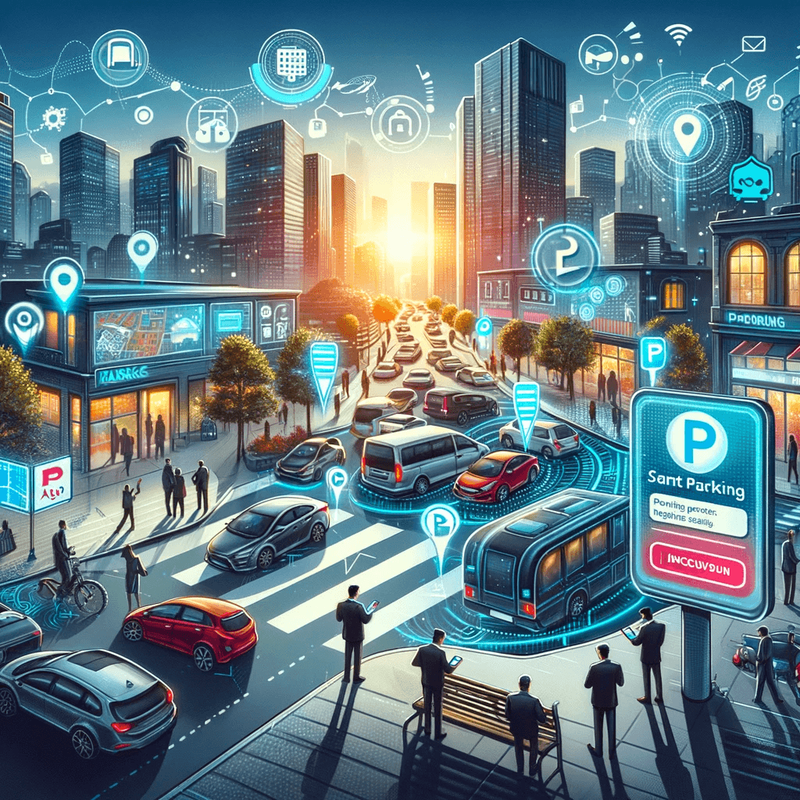
In this comprehensive guide, we'll delve into the world of car parking finder app development, exploring:
- The different types of car parking finder apps: From public on-street parking to private off-street lots, understand the diverse needs these apps cater to.
- Essential features for a user-friendly and impactful app: Discover the functionalities that make a parking finder app truly helpful and convenient.
- The benefits of using AI in parking finder apps: See how AI can optimize parking management, reduce congestion, and improve the overall driving experience.
- The tech stack needed to build a powerful app: Explore the essential tools and technologies that form the backbone of a successful parking finder app.
- The estimated cost of developing such an app: Get a realistic understanding of the investment involved in bringing your app idea to life.
if you walk along with this guide, you'll have a solid understanding of the key considerations and exciting opportunities involved in developing car parking spot finder applications that use AI. Let's navigate the urban jungle together, one smart parking spot at a time!
Also Read | How to Develop a Smart Manufacturing Factory App
The Growing Pain of Urban Parking: A Statistical Snapshot
The problem of vehicle parking in urban regions is not only a private nuisance; it is a developing monetary and environmental topic. Here's a glimpse into the current statistics of this global quest:
- Parking scarcity: According to a recent report an average American driver spends 17 hours per year searching for parking, resulting in an estimated $73 billion in wasted fuel and lost productivity.
- Traffic congestion: A study by the Texas A&M Transportation Institute found that 34% of urban traffic congestion is directly attributable to drivers searching for parking. This translates to an annual economic loss of $160 billion in the United States alone.
- Environmental impact: The World Economic Forum estimates that 25% of urban traffic is comprised of vehicles cruising for parking, contributing significantly to air pollution and greenhouse gas emissions.
- Smart parking solutions on the rise: The global smart parking market is expected to reach a staggering $12.9 billion by 2032, driven by the growing demand for efficient parking management solutions.
These facts & figures paint a clear picture: the lack of good parking is a complicated problem with full-scale financial, environmental and social impacts. However, there may be a glimmer of hope. The rise of smart parking technologies powered by artificial intelligence and information analytics provides promising answers to optimize parking availability, reduce congestion, and create an ultra-sustainable urban environment.
Also Read | How to Develop a Real Estate Mobile App Development
From Frustration to Freedom: The Benefits of Using Car Parking Finder Apps
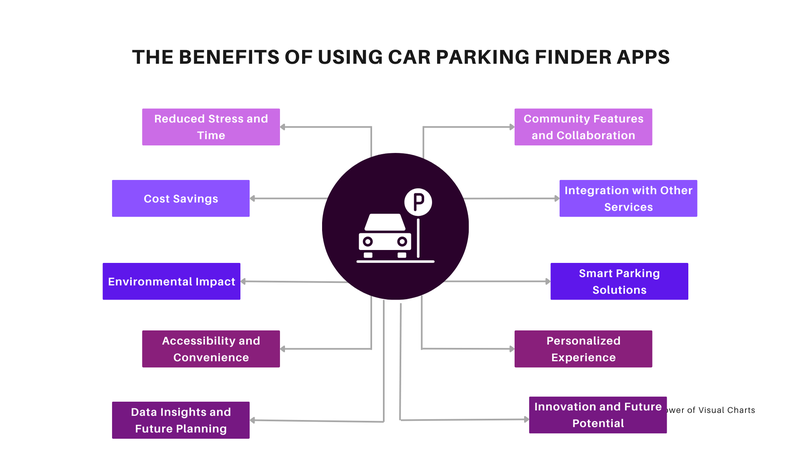
Finding parking in a bustling metropolis can be a soul-crushing experience. Time wasted driving around blocks, the ever-present fear of parking violations, and the frustration of missed appointments are all too familiar struggles for urban drivers. Fortunately, car parking spot finder apps offer a beacon of hope, turning this worrisome chore into a smoother, extra-green, or even fun experience. Let's dive into the numerous benefits these apps offer:
- Reduced Stress and Time: Imagine moving around the metropolis without the constant anxiety of finding parking. The parking spot finder app will show you in real-time that you have spaces, saving you valuable time and eliminating the frustration of aimlessly searching.
- Cost Savings: Forget expensive parking tickets and overpaying for parking meters. Apps can help you find cheaper parking options and even predict parking duration, optimizing your spending.
- Environmental Impact: Less time spent searching for parking translates to reduced fuel consumption and emissions. Choose eco-friendly parking options within the app to further contribute to a greener city.
- Accessibility and Convenience: Whether you have accessibility needs or simply prefer a convenient parking experience, apps can filter options based on your preferences, including EV charging stations, wheelchair-accessible spaces, and valet parking.
- Data Insights and Future Planning: Track your parking records and gain valuable insights into your parking behavior and spending. This statistic will allow you to plan your journeys more efficiently and make informed decisions about your future parking wishes.
- Community Features and Collaboration: Some apps foster a sense of community by allowing users to share parking tips, report vacant spots, and collaborate on finding optimal parking solutions. This collective intelligence can benefit everyone on the road.
- Integration with Other Services: Leverage seamless integration with other apps like navigation platforms, public transportation information, and even event ticketing to create a holistic travel experience.
- Smart Parking Solutions: Advanced apps utilize AI and machine learning to predict future parking availability and suggest optimal routes based on real-time traffic conditions. This empowers you to make informed decisions and avoid congested areas.
- Personalized Experience: Set up custom notifications, favorite locations, and payment methods to tailor the app to your unique needs and preferences, ensuring a truly personalized parking experience.
- Innovation and Future Potential: Car parking finder apps are constantly evolving, integrating new technologies like smart parking infrastructure and autonomous vehicle compatibility. This opens exciting possibilities for a future where parking is truly seamless and stress-free.
By embracing the numerous benefits of parking spot finder apps, you can redesign your usage, enjoy, contribute to a greener urban environment, and enjoy the freedom of navigating the metropolis effortlessly. Are you ready to join the parking revolution?
Also Read | How to Develop a virtual-job-fair-platform
Navigating the Diverse Landscape: Different Types of Car Parking Finder Apps
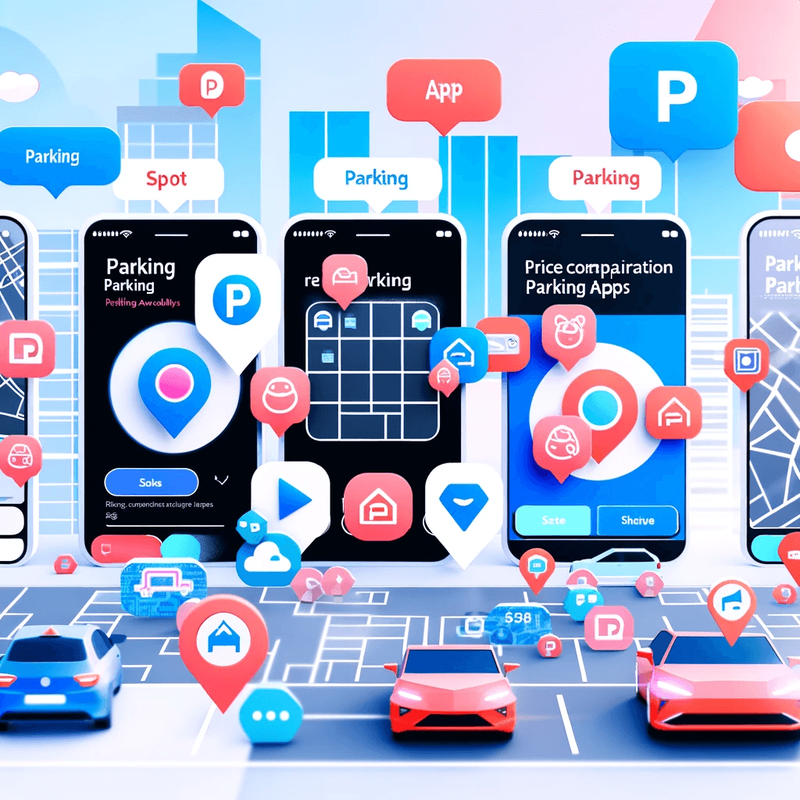
Not all parking lots are created equal and neither are the apps to help you discover them! When it comes to parking spot finder apps, the key is a range that suits the different needs and capabilities of urban drivers. Let's discover the extraordinary kinds of apps available:
Public vs. Private Parking:
- Public parking applications: These applications are recognized when looking for parking on the avenue in designated areas, usually managed with the help of municipalities. They display real-time availability, and parking restrictions or even allow customers to pay for parking without delay through the app. Examples include ParkMobile, PayByPhone, and BestParking.
- Private Parking Apps: These apps focus on off-street parking in private lots or garages. They may offer features like booking reservations in advance, comparing prices, and accessing multi-level parking facilities. Examples include SpotHero, Parkopedia, and JustPark.
On-Street vs. Off-Street Parking:
- On-Street Parking Apps: As mentioned above, these apps cater specifically to finding available parking spots on public streets. They often utilize real-time data from sensors or cameras to update parking availability in real-time.
- Off-Street Parking Apps: These apps focus on dedicated parking facilities like garages, lots, and valet services. They may offer features like filtering by price, amenities (e.g., covered parking, EV charging), and even offer loyalty programs for frequent users.
Real-Time vs. Predictive Parking:
- Real-Time Parking Apps: These apps rely on live data to show the current availability of parking spots. This information might come from sensors, cameras, or user-reported data. While helpful, they may not always be accurate, especially in areas with high turnover.
- Predictive Parking Apps: These apps leverage AI and machine learning to predict future parking availability based on historical data, traffic patterns, and other factors. While not always perfect, they can offer a more informed view of future parking possibilities, helping users plan their routes efficiently.
Subscription-Based vs. Pay-Per-Use:
- Subscription-Based Apps: These apps require a monthly or annual subscription fee, typically offering unlimited access to their features, including real-time parking data, booking reservations, and exclusive discounts.
- Pay-Per-Use Apps: These apps charge users only for the specific services they use, such as paying for parking or booking a reservation. They might be suitable for occasional users or those with unpredictable parking needs.
Remember: This is just a glimpse into the different panoramas of parking spot finder apps. The unique features and functionality delivered will vary based on application expertise, target market, and geography. Choosing the right app depends on your individual wishes and preferences.
Also Read | How to Develop a Flight Booking Mobile Application
The Power of Convenience: Essential and Advanced Features for a Winning Parking Finder App
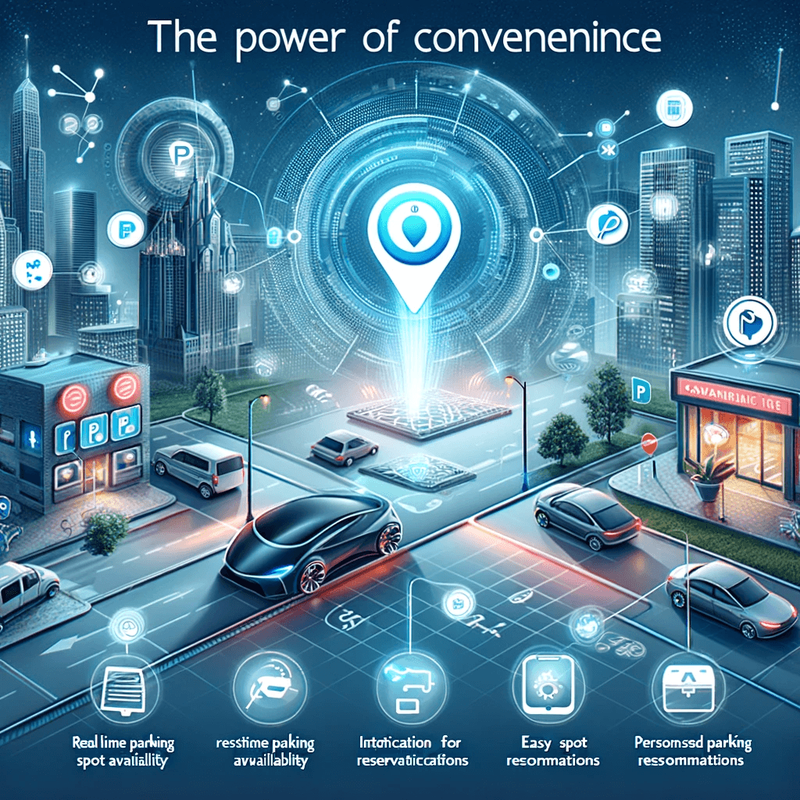
Finding a parking space shouldn't mean winning the lottery; it should be as pure and effortless as hailing a ride. A properly designed parking space finder app, packed with the right features, can turn this worrisome chore into ongoing fun. Let's dive into the essential and advanced features that make an extremely good parking finder app stand out:
Essential Features:
- Real-time parking data: The cornerstone of any parking application is accurate and updated real-time info on available parking spaces. This includes location, type (avenue parking, storage, and many more.), restrictions, fees, and real-time updates via sensors, cameras, or consumer reports.
- User-Friendly Interface: Simplicity reigns supreme! Prioritize an intuitive and easy-to-use interface, even for new or non-tech customers. Clear visual elements, a logical hierarchy of info, and a minimum of garbage will ensure that you enjoy it even when unzipped. Don't overlook the convenience features for many customers.
- Seamless navigation integration: Once you've found a suitable parking spot, getting there shouldn't be a problem. Integrate with famous navigation apps like Google Maps or Waze to seamlessly transition from finding parking to reaching your vacation destination.
- Secure payment processing: Offer stable payment alternatives like credit score playing cards, in-app wallets (Apple Pay, Google Pay), and in-app mobile payment platforms. Prioritize the security of statistics and the privacy of the people you agree with.
- Filtering and Searching: Allow users to filter and search for parking based on various standards such as location, fee, type (road, storage, EV charging), availability options, and parking time.
- Parking history: Allow customers to track past parking sessions, including location, duration, and cost for easy reference and expense management
- Push Notifications: Send timely signals about parking meter expirations, parking availability adjustments, or nearby promotions.
- Offline accessibility: Make simple features like saved places and recent searches available even without a WIFI connection.
- Multilingual support: Provide the app in more than one language and cater to a wider target audience.
- Reviews and ratings: Allow customers to review and rate parking spaces and app features and offer valuable suggestions for improvement.
Advanced Features:
- Reservation: Take convenience one step further by allowing customers to reserve parking spaces in advance, especially in high-traffic regions or for precise occasions.
- Dynamic Pricing: Implement dynamic pricing methods based solely on current time parking demand and location to optimize parking utilization and encourage green space use.
- Community features: Foster a sense of community by enabling customers to share their parking tips, report vacant spots, and collaborate on finding optimal parking solutions.
- AI-Powered Predictions: Leverage AI and machine learning to anticipate future parking availability primarily based on past records, site traffic patterns, and weather conditions, enabling customers to successfully plan for parking.
- Valet Parking Integration: Connect with valet Parking Companies and get the premium price parking experience instantly through the app.
- EV Charging Station Finder: Integration with EV charging station databases to help users find available charging factors and control or manage charging sessions.
- Smart Parking Integration: Connect with smart parking systems and offer up-to-date data on available spaces, entry/exit boundaries, and fee options.
- Public transport integration: Offer real-time info about nearby public transport options for users who choose to park and travel.
- Environmental Impact Insights: Track and share real-time records of carbon emissions saved with the app and promote green parking options.
- Gamification elements: Introduce gamification elements such as bonus points, badges, and leaderboards to motivate app usage and sell effective parking behavior.
Remember: When developing your parking spot finder app, prioritize features that address the exact wants and pains of your target audience. Conduct user research and collect feedback to make sure your app offers value and convenience to customers without a doubt.
By incorporating this comprehensive list of vital and excellent features, you can create a parking space finder app that will revolutionize customer parking and pave the way for a smarter and extra-green urban destiny.
Also Read | How much does it cost to develop a Travel app
Building the Bridge to Smart Parking: Essential Tech Stack for Your App
The basis of a successful application for finding parking spaces lies in its robust and correctly chosen tech stack. This combination of programming languages, frameworks, and tools allows you to create a user-friendly, well-organized, and scalable application that stands proud in a crowded market. Here is a breakdown of the key additives:
Front-End Development:
- Native Development vs. Cross-Platform Frameworks:
- Native Development: (Languages like Swift for iOS and Kotlin for Android) offers optimal performance and device-specific features but requires separate development for each platform.
- Cross-Platform Frameworks: (React Native, Flutter) allow building a single codebase for both iOS and Android, saving time and resources but potentially compromising on performance and native features.
- Front-End Libraries and Frameworks:
Back-End Development:
- Server-Side Languages:
- Databases:
- NoSQL Databases: (MongoDB, Cassandra) Efficient for handling large volumes of unstructured data like user information and parking availability updates.
- Relational Databases: (MySQL, PostgreSQL) Suitable for storing structured data with complex relationships, like user profiles and parking lot details.
Mapping and Location Services:
- Mapping APIs:
- Google Maps Platform: Offers a comprehensive suite of APIs for maps, directions, and location-based services.
- HERE Maps: Another popular option with detailed maps, routing, and geospatial data.
- Mapbox: Customizable mapping platform with offline maps and real-time traffic data.
Payment Processing:
- Payment Gateways:
Additional Tools and Services:
- Push Notification Services: (Firebase Cloud Messaging, Amazon SNS) Send real-time alerts and updates to users.
- Analytics Platforms: (Google Analytics, Mixpanel) Track user behavior and app performance to optimize features and marketing strategies.
- Cloud Storage Solutions: (Amazon S3, Google Cloud Storage) Store user data and app assets securely and reliably.
- API Management Tools: (Apigee, Kong) Manage and secure your API integrations effectively.
Remember: This is a standard review and the specific set of technologies will depend on the specific features, budget, and target audience of your app.
Tech Stack Table:
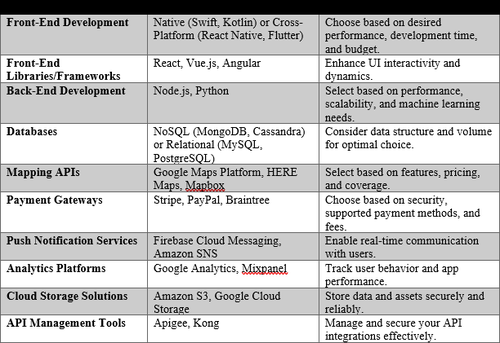
By making careful decisions and integrating the right technologies, you can create a parking application that empowers users, optimizes parking management, and contributes to a cannier and more sustainable urban destiny.
Also Read | How to develop a Food Delivery app like Foodpanda
Estimated Cost of Developing a Car Parking Finder App
Creating a parking spot application requires careful planning and information about financial investment concerns. Development costs can vary greatly depending on many factors, but a reasonable estimate in advance will help you make an informed choice and allocate resources correctly. Here is a breakdown of the key factors affecting cost:
Features and Complexity:
- Basic apps with core functionalities like real-time parking data and payment integration will require less investment than feature-rich apps with AI integration, booking reservations, and advanced navigation features.
Development Team:
- Hiring an in-house development team can be expensive, especially in regions with high talent costs. Outsourcing to development agencies can offer cost-effective options, but requires careful selection and project management.
Tech Stack:
- Open-source tools and libraries are generally free to use, while licensed software or cloud services incur additional fees. Remember to factor in subscription costs for ongoing maintenance and updates.
App Store Submission Fees:
- Both Apple App Store and Google Play Store charge fees for app submission and publishing, which vary based on location and app size.
Marketing and Promotion:
- Attracting users requires effective marketing strategies, which can involve app store optimization, social media campaigns, and potential paid advertising.
Estimated Cost Range:

Remember: These are only estimates and actual costs may be better or lower depending on your unique opportunities. It's important to get targeted fees from capability developers and carefully consider your budget before starting development.
Additional Cost Considerations:
- Ongoing maintenance and updates: Allocate budget for bug fixes, security patches, and feature updates to maintain a high-quality app experience.
- Data storage and bandwidth: Consider the cost of storing large amounts of user data and map information, especially for real-time updates.
- Compliance with regulations: Factor in any legal or regulatory compliance requirements that might impact development costs.
By planning carefully, being aware of price factors, and making informed choices, you can expand your parking search application within your price range and get your preferred dreams.
Also Read | A Step-by-Step Guide to Developing an Indoor Navigation App
Conclusion and Future Outlook
Navigating the urban jungle doesn't have to involve the stress of finding parking. This comprehensive guide has equipped you with the understanding and insights to explore the exciting landscape of parking spot applications. Here is a quick recap of the key information:
Key Points:
- Diverse needs: Different types of apps cater to various parking needs, from public on-street to private off-street, real-time to predictive, subscription-based to pay-per-use.
- Essential features: Real-time data, user-friendly interface, navigation integration, secure payment processing, and advanced features like booking reservations and accessibility filters are crucial for a winning app.
- Benefits: Reduced stress, saved time, cost savings, environmental impact reduction, accessibility, data insights, and a more integrated travel experience.
- Tech Stack: Front-end frameworks like React Native or Flutter, back-end languages like Node.js or Python, mapping APIs, payment gateways, and additional tools like push notifications and analytics platforms form the foundation.
- Estimated costs: Range from $20,000 for basic apps to over $100,000 for feature-rich AI-powered solutions, depending on various factors.
DECODERMIND YOUR TECH PARTNER:
Are you ready to take the next step?
Creating a consumer-friendly, green, and compelling parking application requires information and entertainment. Consider partnering with Decodermind, the best custom software development company in town, to bring your vision to life. Here's why Decodermind is your perfect partner
- Proven track record: We have a wealth of experience in developing innovative and successful mobile apps across various industries.
- Expert team: Our team of skilled developers, designers, and project managers will guide you every step of the way.
- Focus on innovation: We embrace cutting-edge technologies like AI and machine learning to create future-proof solutions.
- Cost-effective solutions: We offer competitive rates and transparent pricing, ensuring you get the best value for your investment.
- Client-centric approach: We prioritize your needs and collaborate closely to achieve your desired outcomes.
Don't let parking problems get in the way of your urban adventures. Contact Decodermind today and let us start building smarter parking solutions the next day!
Future Outlook:
The future of car parking finder apps is brimming with exciting possibilities. Expect advancements in:
- AI-powered predictions: Personalized parking recommendations based on real-time data and user behavior.
- Integration with smart cities: Seamless interaction with connected parking infrastructure and autonomous vehicles.
- Focus on sustainability: Promoting eco-friendly parking options and optimizing resource utilization.
By leveraging these improvements, parking spotting apps have the potential to revolutionize urban mobility and create greener, sustainable, and stress-free parking for all people.

 Hamid Salman
Hamid Salman